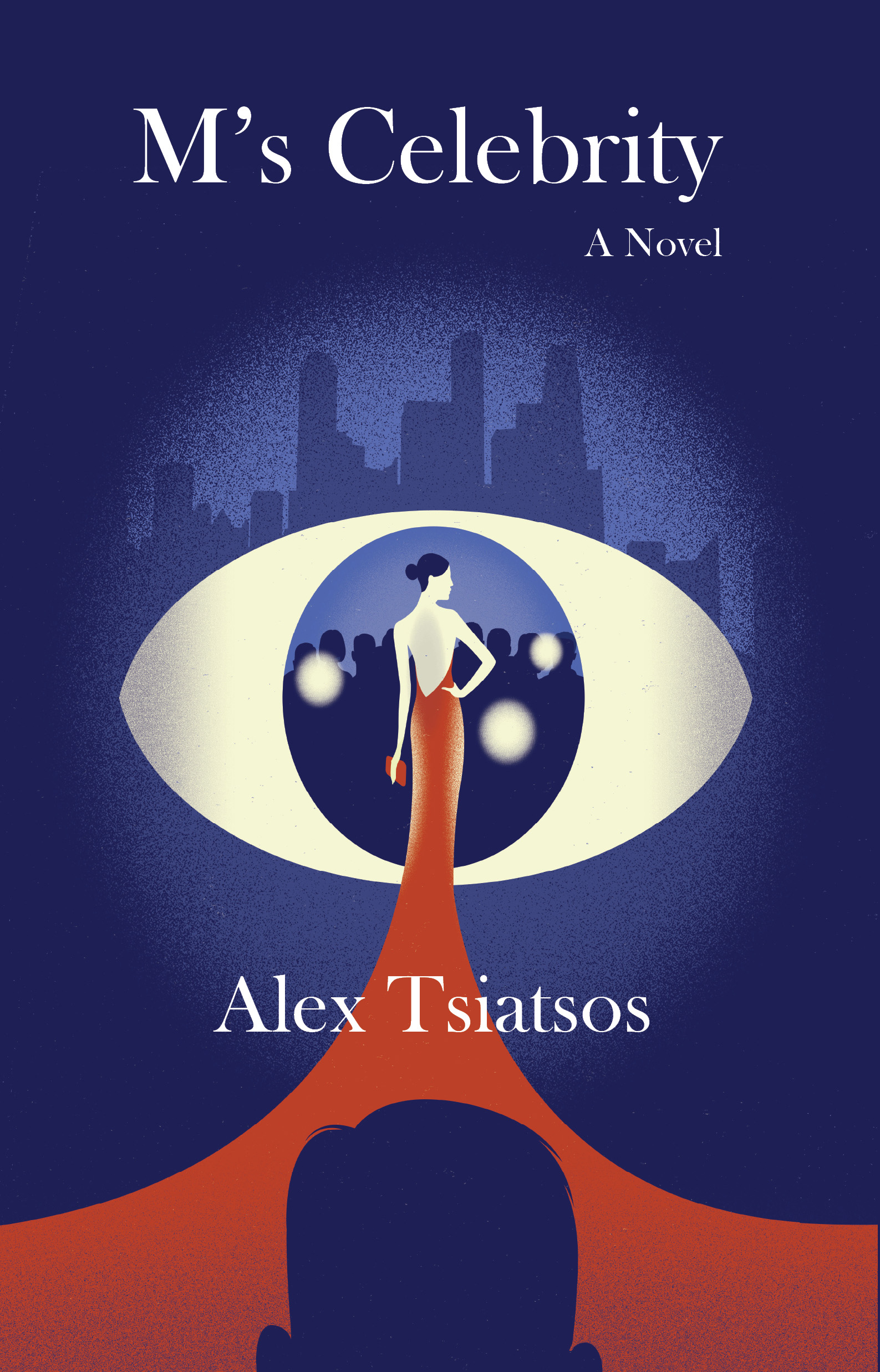M's Celebrity
Steven, the first person narrator, discovers a man whom he refers to as M. Steven believes that M may be a genius, and together they begin a program of activism against what they see as the wrong-headed aspects of their world. Initially, their mostly innocent activities attract like-minded followers. But their eventual focus on Amanda Karlestone, a famously beautiful celebrity whom they believe to be the epitome of everything that they oppose, tests the philosophical purity of their motivations. The final series of dramatic confrontations between Mís world and Amandaís world presents the question of whether Mís project was a work genius or something else entirely.

Chapter One
My friend died almost a year ago. It took me a long time to recognize what he was. A few others know, but the world, in general, canít imagine it.
He left artifacts of his project in corners, and fragments of his influence slowly dilute into the mainstream, but Iím probably the only one who will remember him by connected, personal memory.
* * *
Reporters generally referred to my friend by his full name, Matthew Harrison Westbytal. In this account, Iíll refer to him as ďM,Ē because thatís what I called him. It wouldnít be important to him to
be remembered by name. M never took credit for what he accomplished. But he was the spontaneous, necessary cause of everything that happened.
He failed sometimes, and I still canít comprehend what ultimately happened. (We could have predicted it. I should have predicted it!) But I see now that, when he brought us into his project, he allowed
us to understand nothing less than the very logic of history. I know how that must sound to you. But, by the end of this story, you might believe it.
The world knows much better the other person involved in these events. Even now, you can find her biography in countless places. I hope that the world will forget her after this generation. Iíve
struggled with this account because I wanted to minimize her. But we couldnít avoid her or the other imperfect facts of this story, and, as your faithful narrator, neither can I.
Iíve organized this understanding for you. I have imposed this story on events, some of which were public, some of which were otherwise unwitnessed or unappreciated. Iíve devoted myself to this story.
It remains the one crucial artifact of everything that happened. Iíve tried to be honest in every respect, including in my descriptions of our most questionable actions. Iíve filled this account with
details that embarrass us, although Iíd like to hide them.
Mís project is my life now. I didnít want to be remembered for this, but no one else can tell this story. No one else knows the story. Some nights, when typing these notes, my fingers hit certain keys
and produce nonsense. I feel sick. Iím always tired. The days wear me out. In moments of weakness, I hate the details, the ordinary and impossible details, and I hope that they fade until they disappear
entirely. I rarely gave in to such feelings before. Now, it doesnít matter. Iíll save what has to be saved.
We knew Amanda Karlestone better than anyone else knew her. M studied her. M met her first and knew her in person. He saw her handlers and understood how they manipulated her. He obtained a privileged
view into her world. They shouldnít have allowed him to get so close.
You may remember how beautiful she was. You may remember her fame. Only a few years ago, at the height of her stardom, she filled the world and seeped into every small place. Her life formed the internal
structures in which other people lived. But then, people forget their previous obsessions so quickly.
We saw her once, at an airport, where M correctly calculated that she would have to change planes. (This was the first time that I saw her in person.) Her group, her people, her ďpeeps,Ē her entourage,
those who followed her and served her ó they rolled her luggage behind her. For all of her glamour, she still had to wait with us for a few minutes in a corridor of painted concrete and dirty floors,
surrounded by a semi-circle of people who were slightly less fawning when faced with a delay and the welcome distraction of their devices.
The airline club staff worked as quickly as possible to move her into a waiting room separated from us by layers of frosted glass. She soon retreated into that place, but for a moment, for that one moment
of warm, forgiving equality, she waited with the rest of us, delayed in an airport.
That was enough for me. I watched her and was prepared to do no more because I respected the barriers between me and that other place. But M followed her, naturally fitting in, somehow unnoticed but not
hidden, with the crowd of people around her. Even her security didnít notice. I hesitated, at first, but, in what was for me a great act of faith and bravery, I followed.
The doors opened into a well-decorated room with large, plush seats and an elevated view of the runway. I paused to look around, but the group headed down a longer hallway, passing desks and gatherings of
uniformed staff who turned their heads to watch Amanda as she passed, unsure who else belonged with her.
We walked to the end of the hallway, pausing before two more large doors. I prepared to act in a giddy and stupid manner to convince them of my harmlessness. But M followed everyone else in. I watched
the doors close then walked up to them, touching them slightly. I felt the doors begin to open so easily, so smoothly, as if through some previously unknown process of disintegration. Then I withdrew my
hand, the doors closed, and I retreated. As I left, I heard someone behind the doors say ďHello, sir,Ē then I heard, muffled though it was, Mís self-possessed voice in even meter.
He returned several minutes later, apparently unconcerned by his trespass.
ďHow was it?Ē I asked, not explaining why I didnít follow him all the way in.
ďIt was what you would expect. It was everything that she deserves.Ē
I said something about the wastefulness of luxury, but he rebuked me.
ďWe know what it truly is, but to everyone else, it fits her perfectly. The rest of the world drains itself to accommodate her.Ē
I mumbled something to take the place of a response.
ďSteven, at this point, what do you expect of the world?Ē he asked me.
ďI donít know. I donít think I expect anything from the world in general. What do you mean? What do you expect of the world?Ē
ďI expect it to be unfulfilled,Ē he said, and, of course, I didnít understand.
I donít know how M managed his access that day in the airport. But think of what he did! We determined later that, not only did he anticipate Amandaís arrival, but, somehow, he correctly calculated the
possibility of her delay and her precise accommodation by staffers.
How did he manage to avoid her security? Why wasnít she settled in a chartered plane on the runway, waited upon in more private luxury? I still donít know. One of us suggested that her delay wasnít a
coincidence. I dismissed that suggestion at the time.
Naturally, Amanda didnít know who we were then. I donít know if she ever knew who we were. The difficulty in explaining what we believed ó something so obviously true yet so unfamiliar ó would have made
it hard for someone like Amanda to understand us under the best of circumstances. Amandaís particular self-absorption, and the incessant flattery of her handlers, made it impossible. A more direct approach
would have been fruitless and crude. I know that now.
In earlier drafts of this account, I avoided the impression that we were destined to confront Amanda. I still canít believe that she ultimately appeared in a place where we met her so privately and so
perfectly. Did her handlers miscalculate and drive her toward us? Who were we that anything we did or said mattered? Iíll tell you. We were exactly what we needed to be. We were perfect. M tried,
in his way, to explain why everything happened the way that it did. He knew the natural order of things.
I will tell you Mís story, but Amandaís story comes first.


